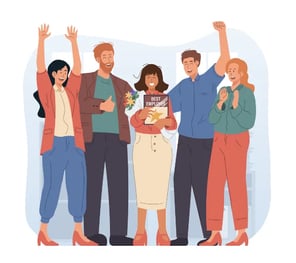Helping new employees succeed in your retail store is best accomplished with a retail sales training program that offers practical skills.
Practical skills are those that the motivated salesperson can put to work right away, not concepts that lend themselves to subjective interpretation.
Rather than general mantras, "our customers should be treated like kings - or queens," solid retail store staff training offers two primary benefits - knowledge and confidence. Specific, relevant knowledge helps new employees to feel secure in their actions.
That security produces a sense of confidence that is demonstrated verbally and non-verbally, increasing sales success and business profitability.
Without confidence, associates frequently sell by offering discounts or discussing your clearance merchandise. That won't make you profitable.
How to go about retail employee training
Here are some actionable steps you can take with your team:
1. Get them comfortable with your products
2. Get them comfortable talking to strangers
3. Get them to notice their body posture
4. Use online retail sales training to make it easier.
See also: 5 Critical Skills How to Coach Retail Salespeople
Let's go deeper...
Developing a solid foundation
When a customer has fundamental questions about a product or service and your retail staff cannot provide solid, knowledgeable answers, the sale is on its way to being lost.
Furthermore, the potential customer's opinion of the retailer has just taken a negative hit. Of course, they won't tell you that. They won't return.
The foundation of successful retail sales training is a thorough knowledge of what is being sold.
When they are not thoroughly familiar with a product, customers expect a salesperson to help them. If they don't, the customer goes to their smartphone and may shop from a competitor while still standing in your store.
A knowledgeable staff builds trust, and trust makes sales and, better yet, repeat customers.
Communication skills are essential
Teaching practical communication skills is one of the most critical elements of successful retail employee training. All the knowledge in the world won't help if your new salespeople lack the skills to communicate that information effectively.
Skills for effectively communicating information include using a professional, not casual tone of voice, clarity in expression, not using slang or jargon, the proper type of eye contact, and remembering not to over-talk or interrupt.
We used to feel good associates just came to us with those skills, but nowadays, some of the most basic skills must be taught by retailers. And if you think it's all about tightly scripted employee-customer interactions. It isn't.
Those have nothing to do with the skills required for effective communication.
Often, the training that focuses so heavily on what is said to customers neglects the other side of the communication equation – listening.
Through listening, more is learned about the customer and what they are looking for, and an associate can better meet that need and take advantage of natural opportunities for upselling.
Understanding the role of non-verbal communication
Often, new employees don't realize how others perceive them and fail to understand the positive and negative potentials of non-verbal communication.
Smart retail sales training addresses this directly, discussing how clothing, hairstyling, and other personal appearance choices can affect interactions with the public.
Posture Matters: A person slouching their way through the store with a sour or surly facial expression doesn't look approachable. The sales associate who basically wants to avoid customers and play on social media should work for a competitor, not you.
Facial Expressions and Eye Contact: The power of a smile and maintaining eye contact cannot be overstated in retail. These non-verbal cues create a welcoming atmosphere, signaling attentiveness and willingness to assist. They play a crucial role in establishing trust and rapport with customers, significantly influencing their shopping experience and likelihood to return.
Overcoming a casual culture
Retail employee training helps to overcome the effects of an increasingly casual culture. Today, people enter the workforce at all ages, not knowing that casual speech and dress are inappropriate for work.
They haven't had direct teaching regarding courtesy, communication, and professional behavior.
New hires are often eager to succeed but haven't yet gained the skills.
Investing in educating them gives these employees the tools they need to be as successful as they – and you – hope they'll be.
Suitsupply boasts new hires spend 90 days in training before they are on their sales floor—amazing dedication to getting it right.
I encourage everyone to come up with a quiz you give orally. Ask the employee about specific parts of your training, from POS to how to handle returns, from product knowledge to adding on, and everything that bothers you that you hear associates ask you.
Read also: Bad Customer Service Examples: 50 Things Retail Employees Shouldn't Do
Take my free 5-part email course to learn how your retail store can outsell any online retailer. You can begin your first lesson by entering your name and email address below ...


